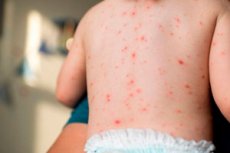New publications
Early childhood susceptibility to chickenpox is proven
Last reviewed: 29.06.2025

All iLive content is medically reviewed or fact checked to ensure as much factual accuracy as possible.
We have strict sourcing guidelines and only link to reputable media sites, academic research institutions and, whenever possible, medically peer reviewed studies. Note that the numbers in parentheses ([1], [2], etc.) are clickable links to these studies.
If you feel that any of our content is inaccurate, out-of-date, or otherwise questionable, please select it and press Ctrl + Enter.

Children have no protection against chickenpox for the entire period of time until they are given the appropriate vaccine. Scientists have analyzed this fact and made the corresponding conclusions, which were subsequently published in the publication PLOS One.
Previously, scientists have assumed that babies in the intrauterine period through the placenta are transmitted all antibodies necessary for protection against most infections, including from chickenpox. However, in the course of a research project, Canadian experts proved that such protection is extremely unreliable and quickly disappears after the baby is born. chickenpox vaccination in Canada is given to children who have reached 12-15 months of age. It turns out that during this time, babies are practically defenseless against the disease. Moreover, in many cases newborn children can become infected as early as 4-6 weeks after birth.
The study included information on nearly 200 babies less than 1 year old who were born prematurely and healthy. Blood samples were taken from all the young participants for testing. Specialists tested the blood using an ELISA method to determine the children's susceptibility to chickenpox. Susceptibility was determined if the antibody concentration was less than 150 mIU/mL.
Scientists found that more than 30% of one-month-old babies were already susceptible to varicella virus, and by the age of three months, the susceptibility increased to 80%. Six-month-old infants were 100% defenseless against chickenpox, their antibody concentration was about 60 mMe/mL or even less.
Experts note that the information obtained indicates that there is a huge gap between the point of loss of chickenpox protection associated with maternal antibodies in children's blood and the period when babies begin to receive their first chickenpox vaccination. According to the findings, an overwhelming proportion of infants become susceptible to chickenpox infection by as early as 4 months of age.
Chickenpox is an intensely contagious disease, the causative agent of which is VZV (Varicella zoster virus), a human herpesvirus of the third type. The infection is transmitted from a sick person by airborne and contact transmission. In about 20% of people who have had chickenpox, antibodies remain in the body for life. In some cases, the infection may "wake up", which will manifest itself not as chickenpox, but as a secondary disease - shingles.
The authors of the project believe that the results of their work are crucial for assessing the optimal timing of chickenpox vaccination, for various preventive measures - in particular, for limiting contacts and strengthening population immune defenses.
Details about this research project can be found at pLOS One
